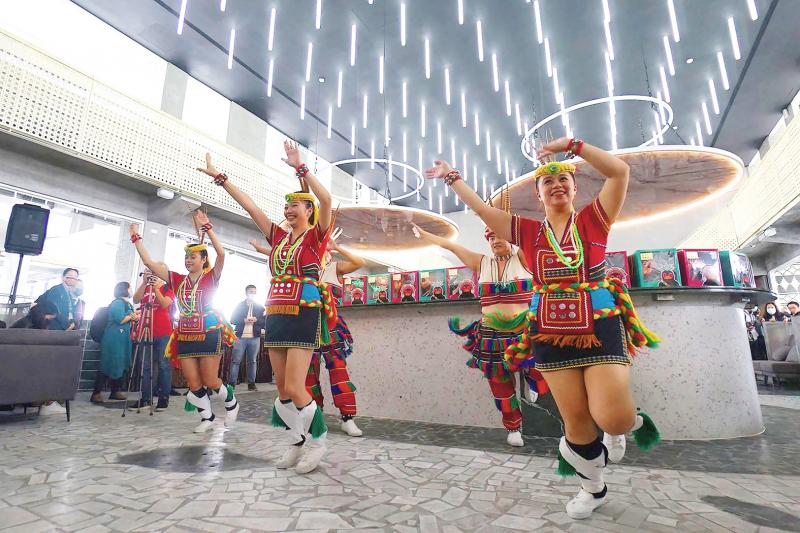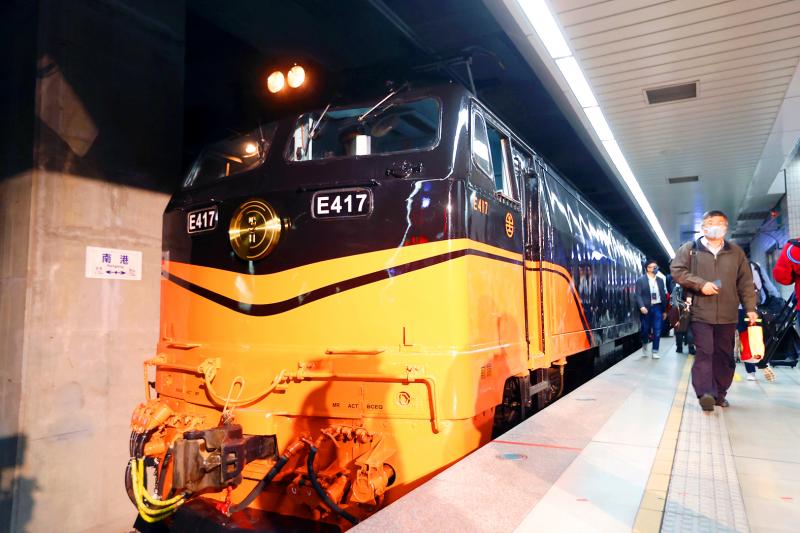The Taiwan Railways Administration (TRA) yesterday unveiled a Future Express train at Nangang Railway Station, which is to be officially launched tomorrow to carry New Year’s Eve revelers to Taitung.
Refurbished from old Chukuang Express trains, the tour trains feature a black and orange exterior and are equipped with one dining car, two lounge cars and three business-class cabins.
The trains’ design helped the agency obtain this year’s Good Design Award from the Japan Institute of Design Promotion.

Photo: CNA
Lion Travel won the right to operate the Future Express and the Blue Train services from next year to 2026 through a public tender.
All seats on the Future Express pilot train services on New Year’s Eve — one leaving from Taipei’s Nangang Railway Station (南港) and the other from Taichung’s Sinwurih Railway Station (新烏日) — have been sold, the travel agency said.
The launch of the Future Express is an important milestone for the TRA, as the nation is to promote railway tourism in 2022, TRA Director-General Chang Cheng-yuan (張政源) said at the unveiling ceremony.

Photo: CNA
In the past, the agency mainly served as a public transport service provider, but now it aims to dominate the nation’s railway tour market, he said.
Chang said that the agency has four main plans to develop railway tourism in the years to come. First, the agency would build transit hubs in Nangang, Sinwurih, Sinzuoying (新左營), Hualien and Fangliao (枋寮), and use them to start building a railway tourism network, he said.
Second, the agency would roll out a series of tourism trains through 2024, Chang said, adding that aside from the Future Express this year, it would present a refurbished Blue Train in May, a Mountain Mist Express and Sea Breeze Express in 2022, and a luxury sleeper in 2024.
Third, VIP rooms would be built at the Hualien, Nangang, Sinwurih and Sinzuoying railway stations, where passengers could access quality services comparable to those at the VIP lounges at airports, he said.
As the South Link Line (南迴鐵路) has been fully electrified, facilities at eight of 16 stations along the line would need to be upgraded, Chang said.
The TRA and Lion Travel would also work together to make Fangliao Station, the starting point of the South Link Line, a fantasy land for Blue Train services, he said.
Fourth, the agency would upgrade the Jiji (集集), Neiwan (內灣) and Pingsi (平溪) branch lines, as well as the Old Mountain Line (舊山線) to tourism branch lines, Chang said, adding that 60 new cars would be purchased to be used exclusively on these lines.
Minister of Transportation and Communications Lin Chia-lung (林佳龍) said that the ministry has made railway travel the tourism theme for 2022.
However, the nation should not wait until then to promote railway tours, he said, adding that 2022 should be the year when railway tourism efforts are reviewed.
Travel agencies such as Lion Travel, which used to focus on the international travel market, would bring new tour experiences to domestic travelers, and in turn, enhance the overall quality of domestic tours, he said, adding that this would also prepare the nation to welcome international travelers when borders are reopened.
The COVID-19 pandemic has caused 71 travel agencies to close this year, but 99 new travel agencies entered the market, Lin said, adding the ministry plans to host a national tourism forum to discuss the future of the nation’s tourism sector with travel industry representatives.
In addition to operating the Future Express and Blue Train services, Lion Travel said that it would be in charge of operating and managing the VIP rooms at railway stations across the nation.
The VIP room in Hualien, which is still under construction, was opened to the media for a preview yesterday.
Aside from tours on New Year’s Eve, the travel agency’s Web site (www.trjourney.org.tw) showed that it would start offering diverse railway tours in February, ranging from cherry blossom-viewing tours to visits to temples and Aboriginal villages.
Tour prices vary from NT$29,900 for a three-day tour to NT$45,900 for a five-day tour.

Nipah virus infection is to be officially listed as a category 5 notifiable infectious disease in Taiwan in March, while clinical treatment guidelines are being formulated, the Centers for Disease Control (CDC) said yesterday. With Nipah infections being reported in other countries and considering its relatively high fatality rate, the centers on Jan. 16 announced that it would be listed as a notifiable infectious disease to bolster the nation’s systematic early warning system and increase public awareness, the CDC said. Bangladesh reported four fatal cases last year in separate districts, with three linked to raw date palm sap consumption, CDC Epidemic Intelligence

The manufacture of the remaining 28 M1A2T Abrams tanks Taiwan purchased from the US has recently been completed, and they are expected to be delivered within the next one to two months, a source said yesterday. The Ministry of National Defense is arranging cargo ships to transport the tanks to Taiwan as soon as possible, said the source, who is familiar with the matter. The estimated arrival time ranges from late this month to early next month, the source said. The 28 Abrams tanks make up the third and final batch of a total of 108 tanks, valued at about NT$40.5 billion

Two Taiwanese prosecutors were questioned by Chinese security personnel at their hotel during a trip to China’s Henan Province this month, the Mainland Affairs Council (MAC) said yesterday. The officers had personal information on the prosecutors, including “when they were assigned to their posts, their work locations and job titles,” MAC Deputy Minister and spokesman Liang Wen-chieh (梁文傑) said. On top of asking about their agencies and positions, the officers also questioned the prosecutors about the Cross-Strait Joint Crime-Fighting and Judicial Mutual Assistance Agreement, a pact that serves as the framework for Taiwan-China cooperation on combating crime and providing judicial assistance, Liang

Reports of Taiwanese going missing, being detained or interrogated, or having their personal liberties restricted in China increased about fourfold annually last year, the Mainland Affairs Council (MAC) said yesterday. Last year, 221 Taiwanese who traveled to China were reported missing, were detained and interrogated, or otherwise had their personal freedom restricted, up from 55 the previous year, the council said. Reopening group tours to China would be risky, as it would leave travelers with no way to seek help through official channels after Beijing shut down dialogue between the associations tasked with handling cross-strait tourism, the MAC said. Taipei’s Taiwan Strait Tourism